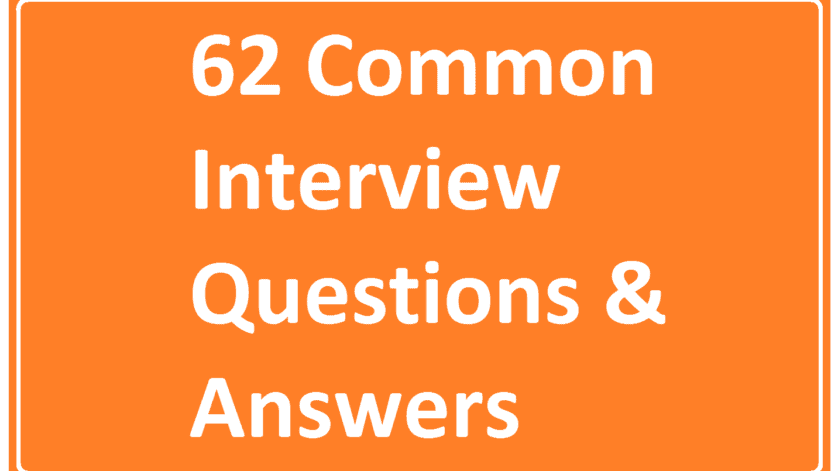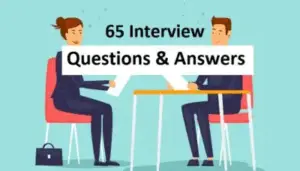Here we are providing you with 62 Common interview questions and answers in order to be prepared for your next interview based on numerous interviews conducted by various HR professionals.
We experience that the candidates who perform best at the interview are those who know themselves and their subject well. They know what they are good at and what tasks they do not master so well. And not least, they are motivated for the position they are applying for.
It is always an advantage to be well prepared, rested, and be with a lot of positive energy. In addition to answering the questions well, it is also important that you are aware of your own body language and facial expressions during the interview. Show that you are interested when the interviewer speaks, communicates, smiles, and asks questions. This will give the person interviewing you a good impression of you as a person.
Here are some tips from us on answering the most common interview questions. you can find both common interview questions and answers.
Q1. Please introduce yourself
Answer Tip: Most people answer this question too often. They only say their name, age, hobbies, and work experience. These are all on their resumes. In fact, what companies want to know most is whether job applicants are qualified for the job, including the strongest skills, The most in-depth knowledge area, the most positive part of the personality, the most successful things you have done, the main achievements, etc. These can all have nothing to do with learning, or they can be related to learning, but you must highlight your positive personality and the ability to do things. , The enterprise will believe it if it is reasonable and reasonable.
Companies attach great importance to a person’s courtesy, job applicants must respect the examiner and say “thank you” after answering every question. Companies like polite job applicants.
Q2. What do you think is the greatest strength of your personality?
Answer Tip: calm and calm, organized, firm stand, tenacious and upward. Be helpful and caring about others, adaptability and sense of humor, optimism, and friendship. I have gone through one to two years of training and project combat in Beida Jade Bird, plus an internship, which makes me suitable for this job. I believe I can succeed.
Q3. Tell me about your biggest shortcoming?
Answer Tip: This question is very likely to be asked by companies. Usually, they don’t want to hear what the shortcomings of a direct answer are. If job applicants say that they are careful, jealous, lazy, bad-tempered, and low-efficiency, the company will definitely not Hire you. Never answer wisely, “My biggest shortcoming is too much pursuit of perfection.” Some people think that this answer will appear to be better, but in fact, he is already at risk.
Companies like job seekers start with their own advantages, add some minor shortcomings, and finally turn the problem back to the advantages, highlighting the advantages. Companies like smart job seekers.
Also Read:- 10 Tips for a Perfect CV for Gulf
Q4. What do you think about overtime?
Answer Tip: In fact, many companies ask this question, but it does not prove that they must work overtime. Just want to test whether you are willing to contribute to the company.
Answer sample: If it is necessary for work, I will be obliged to work overtime. I am single now, without any family burden, and I can devote myself to work. But at the same time, I will also improve work efficiency and reduce unnecessary overtime.

Q5. What is your salary requirement?
Answer Tip: If your salary requirements are too low, it obviously degrades your ability; if your salary requirements are too high, it will appear that you are too heavy and the company can’t afford it. Some employers usually set a budget for the job they are applying for in advance, so the first price they offer is often the highest price they can give. They ask you just to confirm whether the money is enough to arouse your interest in the job.
Answer sample 1: I have no hard and fast requirements on wages. I believe that your company will be friendly and reasonable in handling my problem. I focus on finding the right job opportunities, so as long as the conditions are fair, I don’t account for too much.
Answer sample 2: I have been trained in systematic software programming and do not need a lot of training. And I am also particularly interested in programming. Therefore, I hope that the company can give me a reasonable salary according to my situation and the level of market standards.
Answer sample 3: If you have to say the specific number yourself, please don’t say a broad range, then you will only get the minimum number. It’s best to give a specific number to show that you have done a survey of today’s talent market and know the value of an employee with a degree like yourself.
Q6. What is your career plan in five years’ time?
Answer Tip: This is a question that every applicant does not want to be asked, but almost everyone will be asked. The more common answer is “manager”. But in recent years, many companies have established specialized technical approaches. These job positions are often referred to as “consultants”, “participating technicians” or “senior software engineers” and so on.
Of course, it is also okay to name some other positions that you are interested in, such as product sales manager, production manager, and other jobs that have a background related to your major.
You know, examiners always like enterprising candidates. If you say “don’t know” at this time, you may lose a good opportunity. The most common answer should be “I am ready to make a difference in the technical field” or “I hope to develop in accordance with the company’s management thinking.”
Q7. What do your friends say about you?
Answer Tip: I want to understand your personality and getting along with others from the side.
Answer sample 1: “My friends all say that I am a trustworthy person. Because once I promise others, I will definitely do it. If I can’t do it, I won’t easily promise.”
Answer sample 2: “I feel that I am a relatively easy-going person, and I can get along with different people. When I get along with others, I can always consider issues from the perspective of others.”
Q8. Do you have any questions?
Answer Tip: This question of the enterprise seems dispensable, but it is actually very important. The enterprise does not like people who say “no problem” because it pays much attention to the personality and innovation ability of employees.
Companies don’t like job seekers to ask questions about personal benefits. If someone asks: Does your company have any training programs for new employees, can I participate? Or what is your company’s promotion mechanism? Very welcome, because it reflects your enthusiasm for learning, loyalty to the company, and you are self-motivated.
Q9. What should you do if you find that you are not suitable for this position after working for a while?
Answer Tip: I find that the job is not suitable for me for a period of time. There are two situations:
1) If you really love this profession, then you must continue to learn, humbly learn business knowledge and experience from leaders and colleagues, understand the spiritual connotation and professional requirements of this profession, and strive to reduce the gap;
2) If you think this profession is dispensable, then you should change your profession as soon as possible to find a profession that suits you and you love so that your development prospects will be bigger, which is good for both the unit and the individual.
Also Read:- Amazing Ways handle work-related stress
Q10. For a certain job, you think the way of leadership is not the best, and you have a better way, what would you do?
Answer Tip:
1) In principle, I will respect and obey the leadership’s work arrangements; at the same time, I will find opportunities in private to express my thoughts in a tactful tone and see if the leaders can change their minds;
2) If the leader does not adopt my suggestion, I will also earnestly complete the work according to the leader’s requirements;
3) There is another situation. If the method requested by the leader violates the principle, I will resolutely raise an objection; if the leader is still stubborn, I will not hesitate to report it to the superior.
Q11. If you make a mistake in your work and cause economic losses to the company, what do you think should be done?
Answer Tip:
1) My intention is to work hard for the company. If it causes economic losses, I think the first problem is to find ways to make up or recover the economic losses. If I am incapable of being responsible, I hope the unit can help solve it;
2) It is a matter of responsibility. Distinguish the responsibilities and take their own responsibilities. If it is my responsibility, I am willing to be punished; if it is the mistakes of others in the team I am responsible for, I can’t take pleasure in the misfortune. As a team, we need to support each other to complete the work, comfort, and help colleagues Find the reason and sum up the experience.
3) Summarize experience and lessons. It is impossible for a person to make mistakes in his life. The important thing is to learn from one’s own or others’ mistakes and avoid similar mistakes in future work. Review your own working methods and analyze whether the depth and intensity of the problem are not enough, which leads to mistakes that could have been avoided.
Q12. What do you plan to do if you are not hired in this interview?
Answer Tip: The current society is a competitive society. This can also be seen from this interview. There must be advantages and disadvantages of there is competition, and there will be failures if there is a success. There are often many difficulties and setbacks behind success. If you fail this time, it is only one time. Only through the accumulation of experience can you create complete success.
I will correctly view this failure from the following aspects.
First, we must dare to face this failure, not be discouraged in the face of this failure, accept the reality that we will not look back if we have lost this opportunity, and demonstrate our resistance to this failure in terms of our psychological will and spirit. Have self-confidence and believe that you will be able to surpass yourself through hard work after experiencing this time.
Second, be good at the reflection, and conscientiously summarize the interview experience, think and analyze, and be able to find gaps from their own perspective. Treat yourself correctly, evaluate yourself realistically, treat your strengths and weaknesses dialectically, and be a sensible person.
Third, to get out of the shadows, we must overcome the psychological pressure brought by this failure, always keep in mind our weaknesses, take precautions before they happen, strengthen learning, and improve our own quality.
Fourth, work hard. After returning to the original unit, you must work hard and steadfastly. Thirty-six rows and the top picks, and strive to make certain achievements in this position.
Fifth, make persistent efforts and become a software engineer or network engineer has always been my dream. If I have the opportunity in the future, I will still participate in the competition again.
Q13. If the work you do is praised by your superiors, but your supervisor says he did it, what should you do?
Answer Tip: I will not ask the superior leader to explain this matter first, I will take the initiative to find my supervisor to communicate because communication is the best way to solve the interpersonal relationship, but there will be two results:
1) My supervisor recognizes his mistake, I think I will decide whether to forgive him or not according to the specific situation;
2) He threatened me even more vigorously, then I would not hesitate to ask my superiors to report the matter, because he’s doing so would have a negative impact and be detrimental to my future work.

Q14. Talk about your views on job-hopping?
Answer Tip:
1) Normal “job-hopping” can promote the rational flow of talents and should be supported;
2) Frequent job-hopping is detrimental to both the unit and the individual and should be opposed.
Q15. What should you do if you have difficulty getting along with colleagues and bosses at work?
Answer Tip:
1) I will obey the command of the leader and cooperate with the work of my colleagues.
2) I will find the reasons for myself, and carefully analyze whether my poor work makes the leader dissatisfied and colleagues can’t bear it. We also need to see if we are not doing a good job in dealing with others. If this is the case, I will try to correct it.
3) If I can’t find the reason, I will find an opportunity to communicate with them and ask them to point out my shortcomings. If there is any problem, correct it in time.
4) As an excellent employee, you should always focus on the overall situation. Even if the leaders and colleagues do not understand me for a period of time, I will do my job well and learn from them humbly. I believe that they will see me working hard. , Will smile at me one day!
Q16. Suppose you work in a certain unit and have outstanding results and are recognized by the leader. But at the same time you find that your colleagues are increasingly isolating you. What do you think of this problem? What are you going to do?
Answer Tip:
1) The results are relatively outstanding, it is definitely a good thing to get the leadership, and I will work harder in the future
2) Review whether you are more enthusiastic about work than your colleagues, and strengthen the communication and common interests among colleagues.
3) Don’t hurt others’ self-esteem at work
4) Fiddle with right and wrong before no longer leading
5) Be helpful to the other side
Q17. Have you attended a training course recently? Talk about the content of the training course. Is it company sponsored or self-funded to participate?
Answer Tip: It is at your own expense to participate, you can talk more about the skills you have learned.
Q18. How much do you know about our company?
Answer Tip: check the company’s main business online before going to the company for an interview.
Such as the answer: Your company intends to change its strategy and strengthen OEM cooperation with large foreign manufacturers, and part of its own brand is through overseas distributors.
Q19. Please tell me your motivation for choosing this job?
Answer Tip: This is to know the enthusiasm and understanding of the interviewer for the job, and to select those who take the test on a whim. If you are an inexperienced person, you can emphasize “Even if the job type is different, I hope to have the opportunity to play experience of”.
Q20. What is your best technical direction?
Answer Tip: It’s no harm to show your enthusiasm for courses related to the position you are applying for.
Q21. What can you bring to our company?
Answer Tip:
1) If you can, try to tell them that you can reduce their costs-“I have received professional training from Peking University Jade Bird for nearly two years, and I can start working immediately.”
2) The company really wants to know what future employees can do for the company. Job seekers should repeat their own advantages again and say: “As far as my ability is concerned, I can be an excellent employee to give full play to the organization and bring it to the organization. High efficiency and more benefits”.
Companies like job seekers to indicate their abilities in the positions they apply for. For example, when applying for positions in marketing, they can say: “I can develop a large number of new customers, and at the same time, I can provide more comprehensive and thoughtful services to old customers and develop new customers. Demand and consumption.” And so on.
Q22. What are the three words that best summarize yourself?
Answer Tip: The three words I often use are: strong adaptability, responsible, and consistency in doing things, and explain to the chief examiner with specific examples.
Q23. What is your hobby?
Answer Tip: Find someone who is full of team spirit. Here is a true story: Someone was rejected because his hobby is deep-sea diving.
The examiner said: Because this is a solo event, I’m not sure if he can adapt to group work.
Q24. Give me a score as an interviewee
Answer Tip: try to list four advantages and a very, very, very small disadvantage (you can complain about the facilities, no one will mind the disadvantages of not having a clear responsible person).
Q25. How do you understand the position you are applying for?
Answer Tip: Explain the job responsibilities and tasks and work attitude.
Q26. What do you like about this job?
Answer Tip: I believe that everyone must have an answer in their hearts! Everyone has different values, and the standard of natural justice will be different. However, when answering the question of the interviewer, you can’t say your own psychological words too directly, especially It’s a salary issue, but some innocuous answers are good considerations, such as convenient transportation, the nature of the job, and the content that suits your interests, etc. are all good answers, but if you can think about the job carefully at this time I believe that the difference in the interview will greatly increase the points.
Q27. Why resign?
Answer Tip:
1) Be careful when answering this question. Even if you have been wronged in the previous job, you must not express any complaints about the company. In particular, you must avoid criticism of the company’s own supervisor and avoid negative interviewers. Emotions and impressions;
It is recommended that the best answer at this time is to blame yourself for the problem. For example, if you feel that there is no room for learning and development at work, you want to learn more in the industry related to the job interview, or the previous job is not in line with your career plan, etc. Wait, the answer should be positive.
2) I hope to get a better job, if the opportunity comes, I will seize it; I think the current job has reached its peak, that is, there is no opportunity for promotion.
Q28. Tell me about your views on the development trend of the industry and technology?
Answer Tip: Companies are very interested in this question, and only well-prepared job applicants can pass the test. Job seekers can directly search for information about the industry sector they are applying for, and only a deep understanding can produce unique insights. Companies believe that the smartest job applicants know a lot about the company they are interviewing, including the company’s various departments and developments. When answering questions in the interview, they can mention what they know. The people who are welcome to enter the company are “confidantes.” Not “blind”.
Q29. What are your expectations and goals for your work?
Answer Tip: This is the question used by the interviewer to judge whether the job applicant has a certain level of expectations for himself and whether he understands the job. People who have specific learning goals for work usually learn faster, and naturally easier to enter the situation for new jobs. At this time, it is recommended that you find a definite answer based on the nature of the job.
For example, the job of a salesperson can be answered like this: “My goal is to become a super salesperson, sell the company’s products widely, and achieve the best performance results; in order to achieve this goal, I will definitely study hard, and I’lI believe that with my serious and responsible attitude, this goal will definitely be achieved.”
Other types of work can also be answered in this way, as long as the goal is slightly modified.

Q30. Tell me about your family
Answer Tip: Asking family questions during interviews is not about knowing the job applicant’s family and exploring privacy. Companies do not like to explore personal privacy, but about understanding the shaping and influence of family background on job applicants. What companies want to hear is also the positive impact of family on job applicants.
What companies like to hear most is: I love my family very much! My family has always been very harmonious, although my father and mother are ordinary people, since childhood, I have seen my father get up early and greedy the dark and work very hard every day. My actions virtually cultivated my conscientious and responsible attitude and hardworking spirit.
My mother is kind, enthusiastic, and very helpful, so she is very popular in the unit, and hear every word and deed has always taught me the principles of life.
Companies believe that harmonious family relationships have a subtle influence on a person’s growth.
Q31. With regard to the position you applied for, what do you think you still lack?
Answer Tip: Companies like to ask job applicants about their weaknesses, but savvy job seekers generally don’t answer directly. They want to see job seekers like this: continue to repeat their own advantages, and then say: “For this position and my abilities, I believe that I am competent, but I just lack experience. I think I can enter the company for this problem. To solve it in the shortest time, my learning ability is very strong. I believe that I can quickly integrate into the company’s corporate culture and enter the working state.”
Companies like job seekers who can cleverly avoid difficult problems.
Q32. What kind of personality do you admire?
Answer Tip: honest, unrestricted, and easy to get along with, people with “actual actions”.
Q33. How do you usually deal with criticism from others?
Answer Tip:
1) Silence is golden. Don’t say anything, otherwise, the situation will be worse, but I will accept constructive criticism;
2) I will wait for everyone to calm down before discussing.
Q34. How do you deal with your failure?
Answer Tip: None of us were born to be perfect. I believe I have a second chance to correct my mistakes.
Q35. What will give you a sense of accomplishment
Answer Tip: Do your best for your company; do your best to complete a project.
Q36. What is the most important thing in your life right now?
Answer Tip: For me, finding a job in this field is the most important thing; hope to be able to work in your company is the most important thing for me.
Q37. Why are you willing to work in our company?
Answer Tip: For this question, you have to be extra careful. If you have done research on the unit, you can answer some detailed reasons, such as “the company’s own high-tech development environment is very attractive to me.”, “I was born in the same company. In the same era, I hope to enter a company that grows with me.” “Your company has been developing steadily and has been very competitive in the market in recent years.”
Or “I think your company can provide me with a unique development path.”
All this shows that you have done some investigations, and it also shows that you have a more specific vision for your future.
Q38. Have you ever had a dispute with others? How did you solve it?
Answer Tip: This is the most sinister question in the interview. It was actually a trap set by the examiner. Never say anyone’s fault. It should be understood that successfully resolving conflicts is a necessary ability for members of a collaborative group. If you work in a service industry, this issue has simply become the most important link.
Whether you can get the job will depend on the answer to this question. The examiner wants to see that you are mature and willing to give. They use this question to understand your maturity and abilities in the world. In the absence of outside interference, a compromise solution is a correct answer.
Q39. Which of the things you have done makes you most proud of?
Answer Tip: This is an opportunity the examiner gives you to show your ability to grasp your destiny. This will reflect your potential leadership skills and your possibility of being promoted.
If you are applying for a service unit, you will most likely be invited to lunch. Remember: your future depends on your knowledge, your social skills, and overall performance.
Q40. You are new to a department, and a customer comes to you to solve a problem every day. You try to satisfy him, but you still can’t reach the satisfaction of the masses. He complains about the low efficiency of your department. What do you do at this time?
Answer Tip:
1) First of all, I will stay calm. As a staff member, it is normal to encounter various problems at work. The key is how to recognize them, actively respond to them, and handle them properly.
2) Secondly, I will reflect on the reasons for customer dissatisfaction. The first is to see if it is because of the improper considerations in solving the problem, the second is to see whether the customer does not understand the relevant service regulations and asks for exceeding the requirements, and the third is to see whether the customer understands the relevant regulations. But the request made is unreasonable.
3) Again, take relative countermeasures according to the reasons. If you are really not attentive, make reasonable arrangements in accordance with the service regulations and explain to the customer; if the misunderstanding caused by the customer does not understand the policy and regulations, I will give him a further explanation to eliminate his misunderstanding; If the request made by the customer does not comply with the policy, I will clearly point it out to him.
4) Again, I will explain the handling of the whole matter to the leader, hoping to get his understanding and support.
5) I will not lose my enthusiasm and enthusiasm for work because my customers complain about me, but will always keep in mind the purpose of serving customers, and strive to become an employee who is trusted by leaders, assured by the company, and satisfied with customers as soon as possible.
Q41. What foreseeable difficulties do you have with this job?
Answer Tip:
1) It is not advisable to directly state the specific difficulties, otherwise it may make the other party suspect that the applicant is not good;
2) You can try circuitous tactics and state the applicant’s attitude towards difficulties-“Some difficulties in the work are normal and inevitable, but as long as they have perseverance, a good spirit of cooperation and carefulness in advance With sufficient preparation, any difficulty can be overcome.”
Analysis: Generally, when you ask this question, the interviewer’s hope is higher because they are already talking about the details of the job. But the answer in the conventional way of thinking was “lied” by the interviewer again. When the interviewer asks this question, there are two purposes.
First, check whether the candidate is good at it and whether the difficulty stated is a problem that is generally inevitable in this position.
Second, I want to see whether the candidates are using the right way to solve the problem and whether the company can provide such resources. Rather than trying to understand the candidate’s attitude towards difficulties.
Q42. If I hire you, how will you carry out your work?
Answer Tip:
1) If the applicant lacks sufficient knowledge about the position being applied for, it is best not to directly tell the specific method of carrying out the work;
2) You can try to use roundabout tactics to answer, such as “first listen to the leadership’s instructions and requirements, then understand and familiarize yourself with the relevant situation, then formulate a short-term work plan and submit it to the leadership for approval, and finally carry out the work according to the plan.”
Analysis: The main purpose of this question is also to understand the candidate’s workability and planning, organization, and the focus is on knowing the details. If you talk to the roundabout tactics mentioned in the train of thought, the interviewer will think that it is avoiding the problem, if you guide it several times, it is still avoiding. This person will never be hired.
Q43. What kind of superior do you want to work with?
Answer Tip:
1) Through the applicant’s “hope” to the superior, the applicant’s awareness of self-requirements can be judged. This is both a trap and an opportunity;
2) It is best to avoid specific hopes to superiors and talk more about your own requirements;
3) For example, “As a newcomer who has just stepped into society, I should ask myself to become familiar with and adapt to the environment as soon as possible, instead of making any demands on the environment, as long as I can give full play to my expertise.
Analysis: A better answer to this question is, I hope my superiors can give me more guidance in my work and immediately point out the mistakes in my work. In short, from the perspective of superior guidance, there will be no major mistakes.
Q44. When completing a certain job, you think that the method required by the leader is not the best, and you have a better method. What should you do?
Answer Tip:
1) In principle, I will respect and obey the leadership’s work arrangements; at the same time, I will find opportunities in private to express my thoughts in a tactful tone and see if the leaders can change their minds;
2) If the leader does not adopt my suggestion, I will also earnestly complete the work according to the leader’s requirements;
3) There is another situation. If the method requested by the leader violates the principle, I will resolutely raise an objection; if the leader is still stubborn, I will not hesitate to report it to the superior.

Q45. What will you do if you disagree with your superiors?
Answer Tip:
1) Generally, the answer is “I will give necessary explanations and reminders to the superior. In this case, I will obey the superior’s opinion.”
2) If the interviewer is the general manager, and the position you are applying for is another manager who was not present at the time, you can answer as follows: “For non-principle questions, I will obey the opinions of superiors. For the company involved I hope to reflect on major issues of interest to higher-level leaders.”
Analysis: The standard answer to this question is idea 1. If you use an answer of 2, you will definitely die.
You haven’t figured out the internal situation of the company. First, you want to make a small report. No one like this dares to ask for it.
Q46. You lack work experience, how can you be competent for this job?
Answer Tip:
1) If the recruiting unit raises this question to the applicants of the graduates, it means that the recruiting company does not really care about “experience”. The key depends on how the applicants answer;
2) The answer to this question should best reflect the sincerity, tact, courage, and dedication of the applicant;
3) For example, “As a fresh graduate, there is indeed a lack of work experience, so I have been taking various opportunities to do part-time jobs in this industry during my studies. I also found that actual work is far more knowledgeable and complicated than books. But I have a strong sense of responsibility, adaptability, and learning ability, and I am more diligent, so I can successfully complete various tasks in a part-time job, and the experience gained from it has also benefited me a lot.
Please rest assured that my school and part-time work experience make me qualified for this position. “
Comment: The answer to this question is acceptable. It is better to highlight your ability to endure hardship and adaptability and learning ability (not academic performance).
Q47. What was the reason for the former company’s resignation?
Answer Tip:
1) The most important thing is: the applicant should make the recruiting unit believe that the applicant’s “resignation reason” from the previous unit does not exist in this recruiting unit;
2) Avoid overly detailed and specific “reasons for resignation”;
3) Cannot be mixed with subjective negative feelings, such as “too hard”, “complex interpersonal relationships”, “management is too chaotic”, “the company does not value talents”, “the company rejects our so-and-so employees”, etc.;
4) But they cannot dodge or evade, such as “want to change the environment”, “personal reasons”, etc.;
5) Do not involve your own negative personality characteristics, such as dishonesty, laziness, lack of responsibility, uneasiness, etc.;
6) Try to make the reasons explained to add color to the applicant’s personal image;
7) Related examples: such as “I left because this company closed down; I have worked in the company for more than three years and have deep feelings; since last year, due to the sudden change in the market situation, the company’s situation has taken a turn for the worse; at this point, I I feel very sorry, but I have to face the show and look for a stage where I can give full play to my abilities.”
There is not only one answer to the same interview question, and the same answer is not effective in any interview situation. The key is to grasp the specific situation of the interview after the applicant has mastered the rules, and consciously figure out the psychological background of the interviewer’s question. Then do what you like.
Analysis: Unless the salary is too low, or the initial job, do not use salary as a reason. “Seeking development” has also been heard too much by examiners. The reason for resignation should be designed according to everyone’s true resignation reason, but it must be sincere when answering.
When I really can’t think of it, it can be said that my family is out of town because there is something at home and I have to take a few months of leave, and the company can’t be allowed to leave, so I resigned. This answer is generally acceptable to interviewers.
Q48. In order to do your job well, how do you get support and help from others?
Answer Tip: Every company is constantly changing and developing; of course you want your employees to do the same. You want people who want and welcome change because these people understand that change is an important part of the company’s daily life for the development of the company. Such employees are often easy to adapt to changes in the company and respond positively to changes.
In addition, they can deal with conflicts and problems calmly. The following questions can assess the applicant’s ability in this area. It is said that some people can calmly avoid head-on conflict.
Please tell us about your experience and skills in this area. Sometimes, we have to work with people we don’t like. Tell me about your experience of overcoming character conflicts and achieving the expected work results.
Q49. Talk about successful cases you have done in the past
Answer Tip: Give an example that you are most sure of, and explain the ins and outs clearly, instead of saying a lot but not focusing on it. Don’t exaggerate and claim the credit of others as your own. In order to make sure that the person you want to use is the most suitable, many supervisors will call your previous supervisor to ask for your opinions and opinions on you, so if you lie, it’s easy Banged.
Q50. Talk about the things that frustrated you the most in your past work experience
Answer Tip: once contacted a customer, I heard that they are famous for being picky, so the pre-preparation work was done very well, and a lot of time and energy was invested. In the end, the customer did not accept the order but accepted The extent of this has been beyond our expectations.
I thought I could cooperate happily from then on, but learned that the client finally chose another agent because of the budget relationship, and the previous efforts were lost. Nevertheless, I still learned a lot from this experience, such as the understanding of the industry, the tacit understanding of the entire team is also better.
Analysis: Use this to understand your tolerance for setbacks and mediation methods.
Q51. How to arrange your own time? Will it repel overtime?
Answer Tip: Basically, if the work is efficient and the workload is reasonable, there should be less need to work overtime. But I also know that sometimes it is difficult to avoid working overtime, and now that the work is under the responsibility system, I will allocate my time and cooperate fully.
Analysis: Although no one will work overtime willingly, they still have to show sincerity with a high degree of cooperation.
Q52. Why do we choose you among so many interviewers?
Answer Tip: Based on my understanding of your company, as well as my accumulated expertise, experience, and contacts in this job, I believe it is the talent your company is looking for. In terms of work attitude and EQ, I also have a mellow and mature side, and I can cooperate happily with supervisors and colleagues.
Analysis: Don’t overly boast about your abilities, or write cheques arbitrarily, such as the business that will bring the company how much money, etc., it is easy to give people a sense of boasting and unrealistic.
Q53. What are your expectations for this position?
Answer Tip: I hope to use this to give full play to my learning and expertise, while also absorbing your company’s experience in this area, to create a “win-win” situation for the company and myself.
Analysis: Before answering, you might as well ask the company’s responsibility for this position and attribution, because each company’s situation is different. So as not to say a lot of ideals and ambitions but find that the bull’s head is wrong.
Q54. Why choose this position?
Answer Tip: This has always been my interest and expertise. After several years of training, I have accumulated a certain amount of experience and contacts. I believe I will be qualified for this position.
Analysis: Timely cite past “great achievements” to show your familiarity with the position, but avoid overly exaggerated descriptions or show off.
Q55. Why choose our company?
Answer Tip: I have read reports about your company in newspapers and magazines, and I am aspiring to the ideals I am pursuing. And your company’s achievements in the industry are obvious to all, and there are also systems for the education, training, promotion, etc. of your employees.
Analysis: Before going to the interview, do your homework and understand the background of the company, so that the other person thinks that you really want to get the job, not just exploring the way.
Q56. Do you think you are a good student in school?
Answer Tip: The recruiters of the company are very savvy. Asking this question can test out many questions: If the job seeker has good academic performance, he will say: “Yes, my grades are very good, and all the grades are excellent.
Of course, there are many criteria for judging whether a student is a good student. I think grades are important during school. Other aspects including ethics, practical experience, teamwork, and communication skills are also very important. I also do these aspects. Very good, it should be said that I am a well-rounded student. “
If the job applicant’s performance is not satisfactory, he will say: “I think the criteria for being a good student are diversified, my academic performance is not bad, and my performance in other areas is also outstanding. For example, I went to many places for internships. Yes, I like working at a fast pace and under pressure very much. I have organized ×× activities in the student union to exercise my teamwork spirit and organizational skills.” Experienced recruiters will understand when they hear that companies like honest job hunting By.
Q57. What have you learned at work?
Answer Tip: This is a question posed by the transferee. It is recommended that you can respond with the characteristics of the interview job as the main basis at this time. If the business work needs to communicate with people, you can cite the example of communication between previous work and people. What are the difficulties, what experiences have been learned, grasp these points and make a statement, you can easily pass the test
Q58. Have you ever thought about starting a business?
Answer Tip: This question can show your motivation, but if your answer is “Yes”, be careful. The next question may be “Then why don’t you do this?”
Q59. In addition to this company, what other companies have you applied for?
Answer Tip: Very strange, this is a question that many companies will ask. The intention is to roughly know the applicant’s job ambitions, so this is not absolutely a negative answer. A company with a variety of products”, if you apply for other companies in different industries, it is easy for people to feel that they cannot be trusted.
Q60. When can I start the job?
Answer Tip: Most companies care about the time of employment. It is best to answer \’If you are hired, you can go to work according to the company’s regulations on the day of employment.’ However, if you have not quit your last job and work hours are too close, it seems a bit difficult, Because the handover takes at least one month, the reasons should be further explained, and the admission company should be accommodating.
Q61. You did not graduate from a prestigious college?
Answer Tip: Whether you graduated from a prestigious college is not important, what is important is to have the ability to complete the job you gave me. I have received “ABCD” vocational training, and the skills I master are fully qualified for your company’s current job, and I am better than some prestigious colleges The fresh graduates of the school have stronger hands-on skills. I think I am more suitable for this position in your company.
Q62. What do you think of academic qualifications and abilities?
Answer Tip: I think that as long as the degree is a college degree, it shows that I have the basic learning ability. For the rest, whether you are a bachelor or a doctor, the discussion on this point is not based on how much knowledge you have learned, but on what you have exerted in this field, which is the so-called ability problem.
The level of a person’s workability directly determines his career fate, and the level of academic qualifications is just a stepping stone to enter a company. If your company puts the academic qualifications on the Ph.D., I will not be able to enter your company. Of course, this is not necessarily just my personal loss. If a junior college student can complete a job, why bother to hire a doctoral student?




































